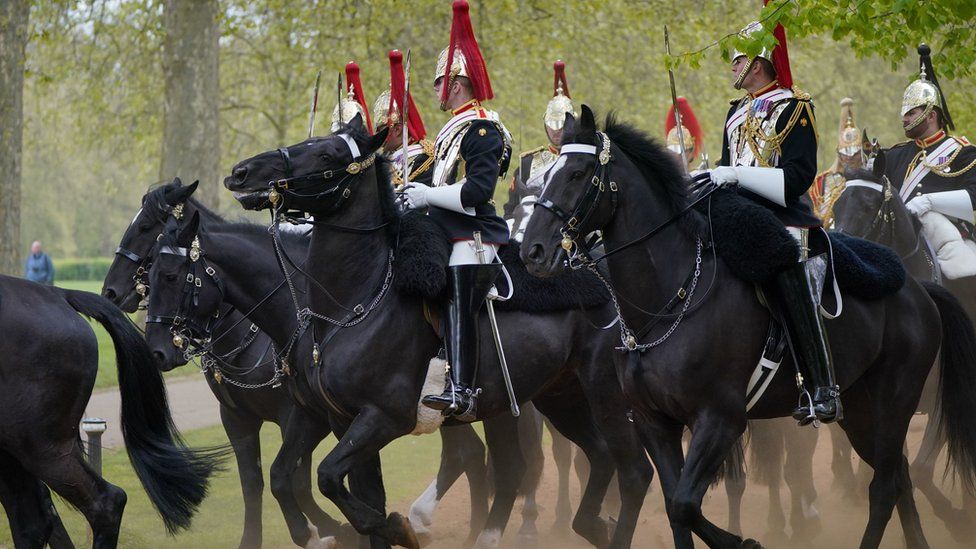'Army horses can get spooked like any other' - former volunteer
- Published

The astonishing sight of rider-less Household Cavalry horses galloping through central London on Wednesday caused alarm and concern.
Four runaway horses were alarmed by a loud noise, it was later confirmed, and bolted through the streets during the morning rush hour.
The two of the animals were seriously injured after hitting a bus and other vehicles and four people were taken to hospital in the incident.
While the horses regularly parade in front of large crowds, their lives in London also involve a lesser-known contact with the public in the form of Army volunteers - known as civi riders - who exercise them every day.
In 1990 Tess Caven took up this role for five years, one which she described as "a privilege".
"It was invitation only, in my case I was introduced through a friend who had ridden as a civi for a while," the now 58-year-old said.
"I had to undertake a test for competency and went through a probation period where you were assigned a range of horses to ensure that you could manage all situations.
"They wanted experienced people," Ms Caven said. "I'd ridden since I was a child and had done quite a bit of training in equitation and horse management over the years."
She volunteered with around five or six other riders and would meet in central London at 06:00 on a regular basis to exercise the horses through Hyde Park.
Most of the 17-hand horses are an Irish Draught or Irish Draught Crosses - known for their athleticism.
Reflecting on Wednesday's incident, Ms Caven said: "These are well-bred, well-fed, fit and sometimes young animals that inevitably can have their moments - like any professional horse - be they a show jumper, eventer or even a police horse."
The horses of the Household Cavalry are trained by the Army for several months and ridden on the streets of London to get them used to heavy traffic and loud noises, including gun salutes and military bands.
But she said all horses can get frightened without warning, something she experienced as a civi rider.
"I remember riding one morning on a really steady chap and caught up with a police woman who was out exercising too.
"We rode together calmly round the back of the Serpentine and out of nowhere, something spooked both our horses.
Household Cavalry: Behind-the-scenes at Bodney camp in 2018
"They each saw something, did a 180-degree turn and tried to flee back up the road."
Thankfully they recovered quickly.
"We both stayed on, brought them back in line and continued happily", she said, adding in a matter-of-fact way that, "it happens".
What is the Household Cavalry?
- The Household Cavalry is a union of the two most senior regiments in the British Army; The Life Guards and The Blues & Royals - each of them retain their own separate identities, colonels, traditions and uniforms but work together as one
- The regiment is divided into the Household Cavalry Regiment and the Household Cavalry Mounted Regiment
- The Household Cavalry Mounted Regiment is the ceremonial face of the regiment, conducting mounted state and public duties in London and is based at the Hyde Park barracks, in Knightsbridge
- Horses from the regiment have taken part in ceremonial duties since 1660 when Charles II was restored to the throne
- Once soldiers complete Basic Training and Royal Armoured Corps Training they spend 20 weeks to be taught the essential skills to become a Mounted Dutymen - so you don't need prior experience of riding a horse
- Once this training is successfully completed, they move to Knightsbridge to join one of the two squadrons in the Mounted Regiment
- Since 1660 Household Cavalry soldiers have ridden, operated and fought on battlefields from Waterloo to Afghanistan.
Source: The British Army
She also remembers a time when things went slightly awry for her, but puts it down to not being observant enough about her horse's temperament that day, rather than loud noises or sudden surprises.
"I think I came off once in five years and that was my fault for not spotting that the lovely elderly horse, Lucitania, was fresher [full of energy, enthusiasm and is likely to be unpredictable] than I thought on a Monday morning."
For Tess the horses' instinctive response to the sudden crash of building material being dropped next to them was no surprise.
"No wonder the poor horses out this week had a panic when a huge construction noise startled them.
"At heart they are still a prey animal that will always put flight as their first defence."
Listen to the best of BBC Radio London on Sounds and follow BBC London on Facebook, X and Instagram. Send your story ideas to hello.bbclondon@bbc.co.uk
Related Topics
- Published25 April
- Published24 April